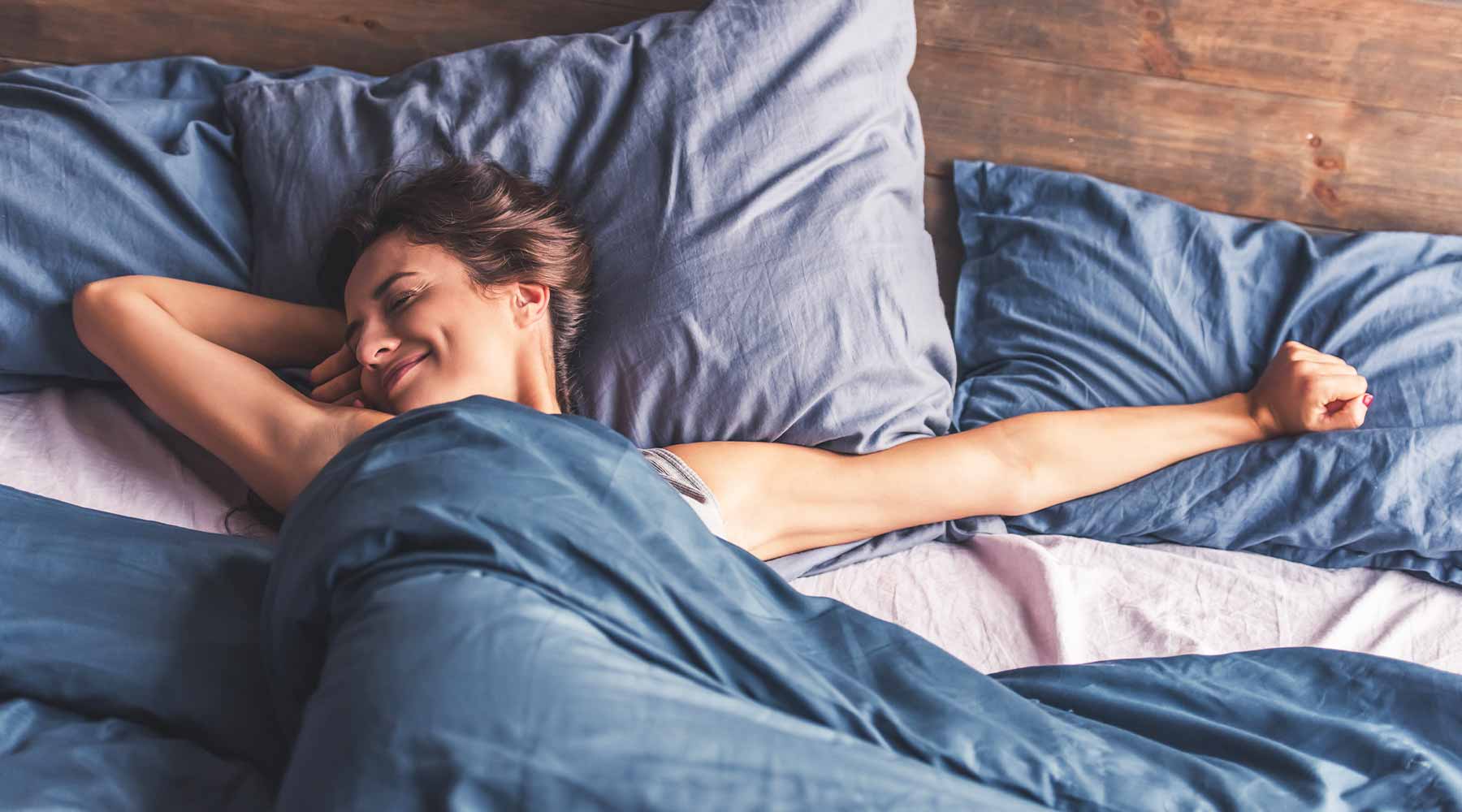
Bad sleep during the period?
The female cycle changes sleep! Here we explain why estrogen, progesterone, and other hormones cause sleep problems and what helps you sleep better around menstruation.
Table of contents
- The female cycle
- Sleep problems during the cycle
- Tips for restful sleep during your period
- Conclusion
Women sleep differently than men – this is scientifically proven. Sleep patterns and gender-specific hormones are directly related. The female cycle has a variety of effects on bodily functions and can therefore also affect sleep patterns. In fact, it's not uncommon for women to experience difficulty falling asleep and staying asleep during their cycle, especially during their period. Let's take a look at how sleep patterns change throughout the female cycle and why hormonal changes disrupt sleep.
1. The female cycle
A woman's natural cycle serves to enable fertility and reproduction and is controlled by the interaction of key hormones, most notably estrogen, progesterone, luteinizing hormone (LH), and follicle-stimulating hormone (FSH). The cycle begins on the first day of menstruation, progresses in phases, and typically lasts 28 days. During this time, a female egg matures, the body builds new tissue in the uterus to prepare for potential fertilization, and then expels it if the released egg is not fertilized. This results in women having "fertile" and "infertile" days, as well as fluctuating hormonal states.
Menstrual phase (1st – 4th day)
The natural cycle begins with the onset of menstruation. Estrogen and progesterone levels in the blood initially drop during bleeding, and the tissue in the uterus is broken down and excreted (menstrual bleeding).
Follicular phase (before ovulation) (5th – 14th day)
The body now produces increased amounts of follicle-stimulating hormone (FSH) to stimulate the maturation of a new egg. After some time, FSH levels drop, and estrogen levels in the blood begin to rise steadily. Estrogen promotes tissue development in the uterine lining and ensures the production of cervical mucus, which plays an important role in egg fertilization.

Ovaluation phase (approx. 12 - 14 days)
Here, estrogen levels drop slightly, while FSH and luteinizing hormone (LH) production increase. Approximately 16–32 hours after this hormonal change, ovulation occurs, during which a fertile egg is released and begins to migrate to the uterus.
Luteal phase (15th – 28th day)
During the luteal phase, everything prepares for impending fertilization. The remnants of the follicle that released the egg are called the corpus luteum and begin secreting the corpus luteum hormone progesterone. Estrogen levels also rise again, while LH and FSH levels decrease. If the egg is fertilized, progesterone levels continue to rise. If fertilization has not occurred, progesterone production stops, and menstruation begins.
2. Sleep problems during the cycle
The fact that women sleep better or worse in certain phases of their cycle is mainly due to hormones Estrogen and progesterone together.They must be in a healthy balance, but this can easily be disrupted.
Estrogens generally appear to have a positive effect on nighttime sleep. Studies show that estrogens make it easier to fall asleep, reduce the number of waking periods during the night, and lead to longer overall sleep time. They also influence various metabolic processes in the brain as well as the deep sleep or REM sleep phases. They also have a positive effect on mood and can thus also help women achieve more restful sleep during the first half of the cycle after menstruation.

During the second half of the cycle, rising progesterone levels alter sleep. The hormone has calming properties and can therefore aid in falling asleep. However, when it drops again, the positive effects naturally disappear. Furthermore, progesterone synthesis is closely linked to the production of the stress hormone cortisol. Stress and the associated increased cortisol release can lead to lower progesterone levels, which also disrupts sleep.
In the days before and during menstruation, both hormones are at a low level. Many women suffer from premenstrual syndrome (PMS) during this time. It describes a variety of physical and psychological symptoms such as abdominal pain, hot flashes, breast tenderness, irritability, and difficulty concentrating, which also hinder restful sleep.
3. Tips for good sleep during your period
Light food in the evening
Large meals sit heavily on the stomach, slow down digestion, and can create additional abdominal pressure. Therefore, make sure you have an easily digestible and balanced evening meal and drink plenty of fluids throughout the day.
Cool, comfortable sleeping environment
Hormonal fluctuations can affect body temperature and the perception of heat. For a good night's sleep, you can maintain a room temperature between 16 and 18 degrees Celsius and transform your bedroom into your personal oasis of well-being.
Pure relaxation
In the days before your period, but also throughout your entire cycle, you should maintain a relaxing evening routine. Especially when your mood isn't so good and you're perhaps not feeling completely comfortable in your body, you can better de-stress before bed with a warm bath, calming music, or meditation.

Gentle movement
Even though many women simply prefer to lie in bed during their period, some exercise can help overcome pain and sleep problems. A gentle walk or a few yoga poses in the evening have been proven to have a positive effect on pain perception and not only help you tolerate menstrual cramps but also help you sleep better.
Studies show that yoga can help relieve pain associated with menstrual cramps. A few exercises before bed can give your body the relaxation it needs for sleep.
4. Conclusion
-
The female cycle is subject to hormonal fluctuations that can affect sleep patterns.
-
Estrogen and progesterone are the female sex hormones that have a positive effect on sleep and whose changing levels promote difficulty falling asleep and staying asleep.
-
To sleep better during your period, targeted relaxation, a pleasant sleeping environment, proper nutrition and gentle exercises such as yoga have proven effective.
Best wishes and see you soon!


Leave a comment
This site is protected by hCaptcha and the hCaptcha Privacy Policy and Terms of Service apply.